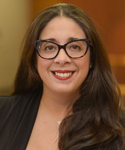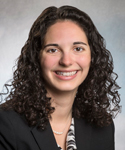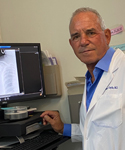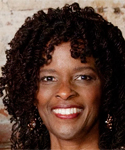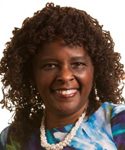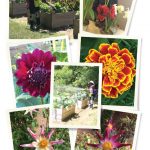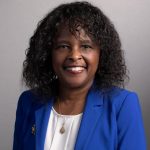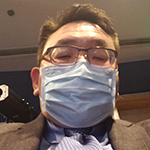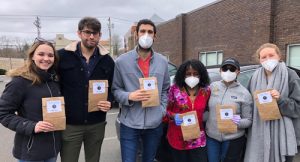
Deborah Desir and medical students from the Frank Netter School of Medicine prepare to hand out masks to physicians in the Greater New Haven area.
Physicians and other healthcare professionals spend their lives giving to their communities by providing essential services to their patients. In addition, rheumatologists may choose to support philanthropic initiatives, work to address healthcare disparities and serve as local leaders to bolster and support their neighbors. During the COVID-19 pandemic, rheumatology professionals have jumped at the chance to help in even more ways.
Outreach Projects & Activities
Getting involved with local patient groups is one meaningful and logical way for rheumatologists and rheumatology professionals to participate in community outreach. Examples:
Irene Blanco, MD, MS, has participated in efforts with lupus patient groups, working to schedule discussions and events designed to bring programming to patients in The Bronx, N.Y., where she is a professor of medicine, associate dean of diversity enhancement and rheumatology fellowship program director at Albert Einstein College of Medicine. The programs are meant to educate lupus patients about their disease, self-management and the importance of taking their medications.
Norman Gaylis, MD, a community rheumatologist in Aventura, Fla., supports his local lupus foundation, lupus support groups and the Arthritis Foundation. He has also supported the National Psoriasis Foundation through fundraising walks, as well as various philanthropic initiatives his patients are involved in.
“In general, we’ve supported the community over the years from a perspective of [patient] groups [with] rheumatic disease that we take care of,” Dr. Gaylis says. “We’ve always been available, wanting to be a resource for them.”
To provide educational resources in her community, Candace Feldman, MD, ScD, helps organize an annual educational forum with the Brigham and Women’s Hospital Lupus Center, Boston, to get health providers involved in community discussions about lupus and nutrition, exercise and research. These programs are put on in partnership with the Lupus Foundation of America, as well as other large groups and smaller, local partners.
“Partnerships with a number of community-based organizations have also allowed our team to develop a community-based lupus education program [through which] we train community leaders about lupus, and they disseminate information through their social networks,” says Dr. Feldman, who is an assistant professor of medicine at Harvard Medical School, Boston, and an associate physician at Brigham and Women’s Hospital Division of Rheumatology, Immunology and Allergy.
In addition to her work on lupus education, Dr. Feldman participates in a Brigham and Women’s Hospital-led partnership with the Indian Health Service. For this work, she volunteers via telemedicine and also strives to spend one week each year on site in New Mexico, where she teaches and provides direct patient care to underserved communities.
Working in support of underserved communities is also a passion for Dr. Blanco, who says that in addition to her rheumatology efforts, she focuses her community outreach on diversity and inclusion. She participates in outreach efforts to increase the number of under-represented students who study health sciences and attend medical school. She also works with her students to provide health outreach, job training and even such tasks as filling out forms with people in need. Another group she supports is the Living Room, which addresses homelessness in The Bronx.
Community physicians aren’t immune from needing a little assistance sometimes, too. As a way to support research efforts among community physicians, Dr. Gaylis established a research grant from the Rheumatology Research Foundation for community rheumatologists. He wanted to give back in this way because of the unique position community physicians are in compared with those who work at large institutions.
“In the community, the physicians are the chief cook and bottle washer. They have to set the rules and create the guidelines—and do the right things on the fly,” he says.
COVID-19 Outreach
The community physician’s leadership role has been especially important during the COVID-19 pandemic. Beyond serving as reliable sources of information, some physicians have also increased their outreach efforts, providing community support during the health crisis.
“What inspired me to do outreach to the community was the rapid realization that different communities within the greater community were not being affected equally by the pandemic,” says Deborah Dyett Desir, MD, assistant professor of clinical medicine at Yale University and president of New Haven County Medical Association, Conn. As part of her work with the New Haven Chapter of The Links Inc., she formed a COVID-19 Response Committee, which arranged a donation of 900 masks to the New Haven Housing Authority.
But that wasn’t all. Dr. Desir worked with her volunteer groups—including The Links, as well as the Theta Epsilon Omega chapter of Alpha Kappa Alpha Sorority Inc.—to get in touch with others in her community who could facilitate outreach where it was needed most and who could help with fundraising. They also donated N95 masks to community physicians who were having trouble obtaining them.
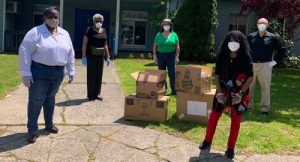
Alderwoman Honda Smith and Links members Camille Cooper, Tracey Philpot and Deborah Desir, along with Sergio Rodriguez, stand ready to deliver needed supplies to residents of Ward 30 in New Haven, Conn.
Initial efforts by Dr. Desir and her husband, other Links members and the New Haven Chapter of The Links totaled $36,000’ worth of masks and grocery gift cards. These donations helped address food insecurity exacerbated by unemployment during the pandemic. Recipients included students enrolled in New Haven Public Schools and their parents, ’r kids Family Center, Christian Community Action and others.
Dr. Desir has also written two grant proposals on behalf of the New Haven Chapter of The Links to support ongoing efforts, resulting in:
- A $20,000 grant from the Community Foundation of New Haven to support educational materials and technology, personal protective equipment and food assistance to inner city children and their families through a partnership with New Haven Public Schools and other organizations serving African American and other at risk communities; and
- A $10,000 grant from the Yale Community for New Haven Fund to support the provision of masks for children, as well as food assistance for New Haven families who have been negatively impacted by the pandemic.
In her community, Dr. Blanco and her students worked to make masks, which they delivered to local hospitals and hospitals in the greater New York City area.
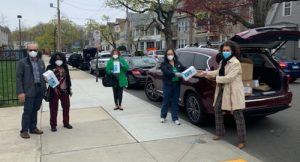
Gary Desir, Deborah Desir, Cathy Graves, Tracey Philpot and Karen DuBois-Walton unload supplies, including reusable masks for New Haven Housing Authority residents.
Taking Care of Patients
Community service is a way of life, according to Dr. Desir. “To whom much is given, much is expected,” she says. Focusing on community outreach is a natural extension of her medical practice, where section meetings include discussions of the community’s underserved populations.
“It’s difficult to separate these issues [such as food insecurity] from the fact that these are our patients,” she says. “So we take care of them.”
Physicians are leaders in their community, and they have the power to protect and advocate for their patients beyond the walls of the office. This idea harkens back to simpler times, Dr. Blanco says, when there was one town physician and everyone went to that doctor.
“We’ve become sub-specialized, but that doesn’t mean we’re not embedded and part of this broader patient community—especially rheumatologists, because you have a very long-term relationship with patients,” she says. “You become part of that patient’s support system and network—their individual community.”
If you’d like to reach out to your community but don’t know where to start, review the list of COVID-19 volunteer opportunities on the ACR’s website: https://www.rheumatology.org/Portals/0/Files/VERA-Volunteer-Opportunities-COVID-19.pdf.
Kimberly Retzlaff is a freelance medical journalist based in Denver.
